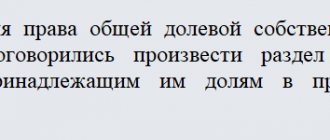How the inheritance is divided between legal heirs How the inheritance is divided after the death of the husband between the wife and children Exclusion of the spousal share from the inheritance estate Division of the inheritance in case of divorce Inclusion of the spousal share in the inheritance property Inheritance in a civil marriage Mandatory share in the inheritance Agreement between heirs on the division of inherited property
Inheritance in our country is carried out in two ways : by law and by will.
The inheritance opens with the death of the testator, that is, the day of his death is the moment the inheritance is opened, and not the moment when the notary opens (starts) the inheritance case, as many people think. These two concepts should not be confused.
Civil legislation contains the concept of “inherited mass”, it includes all movable and immovable property owned by the testator on the day of his death, including his cash savings, obligations to third parties (loan, credit, etc.), as well as property rights of the testator, including those based on contractual relations with third parties (the right to receive accrued wages, repayment of debt, the right to compensation for property damage, etc.)
We described in detail the procedure for entering into an inheritance established by law, within what time frame it must be accepted, and other aspects related to accepting an inheritance in a separate article on entering into an inheritance.
Lawyer (advocate) for the division of inheritance. Tel.+7 Telephone consultation
One of the most pressing issues is the division of inherited property .
The most frequently asked questions from our clients:
- Is inherited property subject to division?
- How to divide an inheritance
- Is inherited property subject to division during divorce?
- How is the division of inherited property carried out?
- How to dispute an inheritance
- How is the inheritance divided between the wife and children from the first marriage?
- How to divide an inheritance
- How to challenge an inheritance under a will
- How to allocate a marital share after the death of a husband
- How to divide an apartment by inheritance
- How to allocate your share of the inheritance
Disputes between heirs arise both during inheritance by law and in the presence of a will. The reasons may be different, for example, a dispute arises in connection with the allocation of a mandatory or spousal share in the inheritance, the inclusion of property in the inheritance mass, or in connection with the restoration of the deadline for accepting the inheritance to one of the heirs, which entails a redistribution of shares in the inheritance, etc.
Of course, the heirs can peacefully agree on how to divide the inheritance among themselves, but in order to legally secure such a distribution, they will need to enter into an agreement on the division of inherited property .
Unfortunately, not everyone succeeds in coming to an agreement and peacefully dividing the inheritance, and then the inheritance dispute can only be resolved in court.
So, division of the inheritance is possible:
- By agreement of the heirs on the division of the inheritance
- By the tribunal's decision
How is the inheritance divided between legal heirs?
The first thing you need to know is when inheritance by law is possible:
- Inheritance by law is not changed by a will, that is, the testator did not make a will during his lifetime
- The will was declared invalid by the court
- The heirs under the will did not accept the inheritance (the will was not presented for execution)
- The heirs under the will refused the inheritance
- The will is canceled by the testator
- The heirs under the will are excluded from inheritance as unworthy
- The heir under the will died before the opening of the inheritance or at the same time as the testator, and the will does not designate an heir
As is known, there is a strictly defined order of inheritance , based on kinship and marital relations with the testator, but when dividing the inheritance, the priority right of inheritance by the disabled dependents of the testator, who have the right to an obligatory share in the inheritance even in the presence of a will, is taken into account.
Heirs of subsequent orders inherit only on the condition that there are no heirs of previous orders: either they are absent altogether, or none of them has the right to inherit, or all the heirs of the previous order did not accept or refused the inheritance.
The law provides for eight lines of inheritance (Articles 1142-1148 of the Civil Code of the Russian Federation):
1st priority: children, parents, spouse of the testator (grandchildren inherit as part of the first priority by right of representation )
2nd priority: siblings and step-brothers, as well as grandparents of the testator (the testator’s nephews and nephews inherit as part of the second priority by right of representation)
3rd priority: siblings and half-brothers and sisters of the testator’s parents, i.e. uncles and aunts on both sides (cousins and brothers inherit in third place by right of representation)
If there are no heirs of the first three orders, then the right of inheritance is transferred to the heirs of the subsequent orders:
4th stage: great-grandparents of the testator
5th line: cousins, granddaughters and great-aunts, grandfathers of the testator
6th line: great-great-grandchildren and great-uncles, aunts of the testator
7th stage: stepsons and stepdaughters, as well as stepfather and stepmother of the testator
8th stage: disabled dependents of the testator who are not related to him
One important aspect should also be remembered: conceived a child during his lifetime , then the inheritance can be divided only after the birth of this child, since he will be the heir of the first priority and share the inheritance equally with other called heirs.
Read more about how the testator's grandchildren inherit, who is considered the testator's disabled dependents, and how the inheritance is divided if there are disabled dependents of the testator .
Lawyer on inheritance issues in St. Petersburg. Tel.+7 (812) 989-47-47 Telephone consultation
The first principle of inheritance by law says that the inheritance is divided only between the heirs of one line called to inherit . Heirs of the second and third orders, and even more so heirs of subsequent orders, do not have the right to claim an inheritance in the presence of first-priority heirs, with the exception of the disabled dependents of the testator, who have the right to inherit on an equal basis with the called heirs, regardless of which order of inheritance they themselves belong to.
The second principle of inheritance by law is the principle of equality of shares in the inheritance.
The division of the inheritance between the heirs of the called line is based on equality of shares (Part 2 of Article 1141 of the Civil Code of the Russian Federation).
However, shares in the inheritance are not always distributed equally. This applies to cases where the right of inheritance after the death of the testator passes to the heirs by right of representation and in the order of hereditary transmission .
If there are several heirs by right of representation or heirs by transmission, they do not inherit on an equal basis with the other heirs of the called line, but share among themselves only one share of the inheritance, which was intended for the deceased heir (Articles 1146, 1156 of the Civil Code of the Russian Federation).
How is the inheritance divided between the wife and children after the death of the husband?
The children and spouse of the testator are classified by law as heirs of the first priority, as his closest relatives.
Accordingly, when dividing the inherited property, their shares will be absolutely equal , although in reality it seems that the surviving spouse receives the largest part of the inheritance.
This is due to the spousal share of the surviving spouse.
Let's figure it out.
The property of spouses in a registered marriage, and acquired during this marriage, belongs to both of them equally, that is, it is their common property (Article 256 of the Civil Code of the Russian Federation).
If at the time of the death of one of their spouses all jointly acquired property is distributed between them in equal shares, then no questions arise in the future; only the testator’s share will be included in the estate.
If all jointly acquired property is registered in the name of the testator by the day the inheritance is opened, then the marital share of the surviving spouse must be allocated , and this allocated marital share is not subject to division between the heirs; only the remaining half of the property, and the heirs of the first priority, are included in the category of inheritance , including the surviving spouse himself, inherit it in equal shares.
Thus, half of the property passes to the surviving spouse not by inheritance, but as a marital share .
As we see, there is no deviation from the equality of shares when inheriting by the spouse and children of the testator.
Exclusion of the spousal share from the inheritance estate
The notary who is in charge of the inheritance case can separate the surviving spouse's spousal share from the inherited property and exclude it from the inheritance mass.
The marital share of the surviving spouse is subject to allocation even in the presence of a will. For example, it may happen that all the property acquired during the marriage and registered in the name of the testator was bequeathed to him.
In this case, of course, the spousal share of the surviving spouse is also subject to separation from the estate, since it cannot be bequeathed.
As a general rule, when dividing the jointly acquired property of spouses, their shares in this property are recognized as equal (Article 39 of the Family Code of the Russian Federation), accordingly, the spousal share of the surviving spouse is at least half of the total property.
The notary acts in accordance with the norms of the Fundamentals of Legislation “On Notaries”, according to which, in order to allocate the marital share, the surviving spouse must submit to the notary a corresponding application for the allocation of the marital share from the inheritance.
Accordingly, the heirs of the first stage will divide the remaining part of the property among themselves.
In some cases, other heirs may not agree with the allocation of the marital share to the surviving spouse of the testator.
The classic situation is when during his lifetime the testator was in a registered marriage, but for a long time he did not actually maintain marital relations with his wife, they lived separately, did not have a single budget, and the testator acquired part of the property, including real estate, during this period . Under such circumstances, the heirs of the deceased may challenge the surviving spouse's right to half of the testator's property, which was acquired during the period when the marital relationship between him and his wife was actually terminated.
Consequently, the dispute in this case is subject to resolution by the court, and of course, the heirs will have to present indisputable evidence of their position in court.
The division of the inherited property will be made based on the evidence presented by the parties.
Lawyer (advocate) for inheritance disputes. Tel.+7 (812) 989-47-47 Telephone consultation
Indivisible property upon inheritance
According to Article 133 of the Civil Code of the Russian Federation, a thing is recognized as indivisible, the real division of which cannot be carried out without destruction and damage to such property, as well as a change in its purpose.
For example, a car inherited by two persons is indivisible, due to the fact that its physical division will cause a complete loss of the ability of such a thing to fulfill its functional purpose inherent in the vehicle.
In addition, according to practice, an apartment located in a multi-story building will not be subject to division, since in most cases the layout of such premises does not provide the possibility of separating parts of the said real estate in kind, as in the case of dividing a residential building by inheritance.
Division of inheritance during divorce
The notary cannot always independently allocate the marital share and exclude it from the inheritance mass.
If at the time of opening the inheritance the marriage between the testator and his spouse was dissolved, the allocation of the marital share of the testator's former spouse is possible only through a judicial procedure.
The fact is that a notary can allocate the spousal share of the surviving spouse , that is, only if at the time of death the testator was in a registered marriage. If we are talking about the share of ’s former spouse , then the notary may refuse to accept his application for the allocation of the marital share and explain to this person the right to file a corresponding claim in court, and the court will determine the shares of all heirs taking into account the allocation of the plaintiff’s spousal share.
Property division agreement
The agreement is the second option for the voluntary division of joint and personal property of the parties. A prerequisite for division is that at least one of the spouses has ownership rights to the property. The agreement cannot provide for the division procedure for objects that have not yet been acquired by citizens.
The document is drawn up in writing. It cannot be concluded before marriage. This type of division is intended exclusively for spouses and former spouses.
The law establishes the possibility of concluding an agreement during the marriage and 3 years after its dissolution. A prerequisite is that the terms of the document are voluntary. If one of the parties has contradictions, its registration is impossible.
The statement of claim for division of property can be downloaded here
If the parties have entered into an agreement, then the property cannot be divided in court. The exceptions are the following situations:
- the document was concluded against the good will of the spouse;
- the property contains objects that do not belong to the parties;
- the citizen entered into a document under threat of violence or in a state in which he could not understand the consequences.
The agreement does not include conditions regarding the property. The document cannot provide for payment for the wife in the event of the birth of a child and the citizen’s obligation to make loan payments.
Inclusion of the marital share in the inheritance property
The subject of litigation may also be a situation where, on the contrary, it is necessary to include in the inheritance the property to which the testator was entitled on the basis of family law, that is, his marital share in the property acquired during the legal marriage.
Such disputes arise in cases where all the property was registered in the name of the surviving spouse or the former spouse of the testator, but during the life of the testator the division of property between them was not made.
The fact is that the mere fact of having property recorded in the name of the surviving spouse of the testator, but acquired during marriage with the testator, does not give the notary the right to include half of this property in the estate as the testator's spousal share.
A notary has the right to determine the share of the deceased in the common property of the spouses only upon the written application of the surviving spouse of the testator, or upon the application of other heirs, and only with the consent of the owner of the property.
If the owner of the property does not agree to the allocation of the testator's marital share in the property acquired during the marriage, then this issue can only be resolved by the court.
Help from a lawyer with the division of inheritance. Tel.+7 Telephone consultation
✨ Summary
As a general rule, inheritance received by one of the spouses during marriage is not divided upon divorce.
Even if the inheritance was sold and other property was purchased with the proceeds, it still does not become joint property, since it was acquired with the personal funds of one of the parties. However, in this case, the spouse who wants the property to be recognized as his personal property will have to prove that it was purchased with an inheritance. To do this, all transactions, starting with the sale of inheritance, must be carried out through the bank, not allowing cash transactions - so that all transactions and the origin of funds are visible to the court.
An inheritance can be divided during a divorce only if the second spouse has significantly increased the market value of the inherited property - for example, paid for expensive repairs from personal or family money.
Inheritance in a civil marriage
Of course, this article should also touch on such a pressing issue - inheritance without a will in a civil marriage.
Is it possible to receive an inheritance in a civil marriage? The answer is clear - no, according to the law, the “common-law spouse” of the testator cannot inherit his property. This is only possible by will.
Let's look at the intricacies of this issue.
As is known, the right of inheritance is based on blood relationship with the testator, that is, the heirs of all orders, except the eighth, are related to one degree or another with the testator.
The only exception is the spouse of the testator , because his right of inheritance is based not on blood relationship, but on marital relations with the testator , which are regulated by family law.
Marital relations presuppose a legally registered marriage between a man and a woman, that is, a marriage officially registered with the registry office.
The concept of “civil marriage” as such is not contained in Russian legislation. But this term is widely used among the people, although in essence such relationships between a man and a woman are cohabitation, which does not entail for them any rights and obligations arising from marital relations, and therefore does not entail inheritance rights to each other’s property.
What does this mean? If a man and a woman lived together for many years, ran a joint household, jointly acquired movable and immovable property (cars, apartments, land, etc.), but did not legalize their relationship by registering the marriage in the registry office, in the event of the death of one of them, the second cannot inherit the property of the first, even if all the property acquired during the period of cohabitation was registered in the name of the deceased.
As an example, consider the following situation:
Ivanov and Vasilyeva cohabited for five years, lived in a jointly purchased apartment, ran a common household, but did not register their marriage. The man suddenly dies, and the apartment and land that were purchased during the period of cohabitation with Vasilyeva were registered in his name.
Ivanov’s parents, as heirs of the first stage, turned to the notary with an application to enter into inheritance rights, and indicated as part of the inheritance mass an apartment and a plot of land registered in their son’s name. As a result, all of the specified property was divided between the parents of the deceased, to whom the notary issued certificates of the right to inheritance by law.
Vasilyeva was not included in the circle of heirs. She tried to prove in court her right to half of the property of the deceased, justifying this by the fact that it was acquired during the period of actual marital relations, and therefore she was entitled to a spousal share. The court rejected Vasilyeva's claim.
Through the court
If the parties do not find common ground on the issue of dividing shares of the property transferred by the testator, the only option for resolving this dispute is to appeal to the judicial authorities by filing an appropriate statement of claim.
This document must be drawn up in accordance with the requirements of Chapter 12 of the Civil Procedure Code of the Russian Federation.
Section order
In order to carry out the division of an inherited apartment in court, you must go through the following algorithm of actions:
- Conducting an assessment of the value of real estate. As in the case of concluding an agreement, such actions must be performed to determine the exact price of housing, as well as to calculate the state duty.
- Collecting the necessary documentation and drawing up a statement of claim, with further submission of the document to the court at the location of the disputed property.
- Participation in the judicial process and waiting for a decision on the case under consideration.
- Fulfillment of the requirements of the decision made by the court. If there is a evasion of the parties from fulfilling the requirements of the specified document, the interested person has the right to contact the territorial branch of the FSSP to enforce such a decision.
Claim for division of property
The claim is filed with a judicial body, the territoriality of which is determined by the location of the inherited property. This rule is in the interests of the heirs, as it can speed up the process of considering the case in court (the examination of real estate is carried out much faster).
Expert opinion
Stanislav Evseev
Lawyer. Experience 12 years. Specialization: civil, family, inheritance law.
To resolve the issue in court, it does not matter which of the recipients of the inheritance filed the claim. A more important role is played by the limitation period, which should not exceed three years, calculated from the date of opening of the inheritance. The claim must indicate exactly how it is preferable for the successors to divide the transferred property.
The general requirements for the application are specified in Art. 131 of the Code of Civil Procedure of the Russian Federation, while Article 132 of the Code of Civil Procedure of the Russian Federation establishes the requirements for the attached documents. There are no special requirements for this category of cases in the law; the claim is drawn up taking into account the realities that have developed in practice.
The claim must include:
- name of the judicial authority, its address;
- full names of the parties (heirs), their addresses of official registration and real place of residence;
- title of the application, price of the claim;
- circumstances of the dispute: when the testator died, what he left, description of the property;
- the reasons for the dispute between the heirs, a reference to the impossibility of resolving them peacefully;
- proposed option for dividing property, conditions, size of shares, compensation;
- link to the regulatory framework;
- evidence: conclusion of a construction expert on the possibility of division; technical documents, etc.
- demand for division of property addressed to the court;
- personal signature of the plaintiff, date of filing the claim;
- list of attached documents.
It is best to entrust the drawing up of a statement of claim to an experienced lawyer, since any mistake will lead to the abandonment of the claim and will give the heir the opportunity to hide the inherited property.
The claim is drawn up in two copies - one for the court, the second for the defendant. The plaintiff can take a third copy with him if he submits the claim in person - a mark indicating acceptance of the document will be placed on it.
If third parties are involved in the case - for example, co-owners of inherited property, they are also indicated in the application and a copy of the claim for the division of inherited property between the heirs is attached for them.
Sample statement of claim for division of property between heirs
To independently prepare a claim for division of property between heirs, you can use the sample presented below.
Claim for division of property between heirs
Please note that the document is not universal - it must be prepared individually for each situation. Consult with an attorney before filing documents with the court. Consultation with our specialist is free - just ask a question.
Documentation
In order for the statement of claim to be accepted by the court and not sent back to the applicant, the following must be attached to the specified document:
- report on the valuation of real estate;
- copies of the statement of claim for all parties to the case;
- confirmation of payment of state duty;
- documents identifying the identity of all participants in the process;
- death certificate of the testator;
- certificate of inheritance;
- other documents that are essential for a comprehensive and complete consideration of the court case.
Trial
Once the statement of claim has been drawn up and submitted to the appropriate judicial authorities, the process of resolving the dispute in court begins.
When considering the case, the court is guided by the arguments of the parties, the materials of the expert opinion, as well as other evidence substantiating the claims and, as a result, establishes the following circumstances:
- possibility of real division of the apartment;
- establishing the method of use of inherited housing by the parties to the case, the need to determine for such persons shares of residential real estate;
- the possibility of assigning monetary compensation to one or more heirs, proportional to the share of the transferred real estate;
- whether the successors agree to the sale of the apartment and the subsequent distribution of the proceeds from its sale.
Depending on which of the above division options will be preferable for each of the parties, the latter must argue their position, referring to specific evidence, as well as to the norms of the current legislation.
Expenses
Considering the fact that this category of claims is of a property nature, such a document is subject to evaluation. The amount of the state duty is calculated based on the amount of claims, that is, the estimated value of the divided apartment, in accordance with the standards provided for in Article 333.19 of the Tax Code of the Russian Federation. The calculation formulas are below.
| Cost of claim | Calculation formula |
| Up to 20 thousand rubles inclusive | 4% of the claim amount, but not less than 400 rubles. |
| From 20,001 to 100 thousand rubles | 800 rub. + 3% of the claim amount exceeding 20 thousand rubles |
| From 100,001 rub. up to 200 thousand rubles | 3200 rub. + 2% of the claim amount exceeding 100 thousand rubles |
| From 200,001 to 1 million rubles | 5200 rub. + 1% of the claim amount over 200 thousand rubles |
| More than 1 million rubles | 13200 rub. + 0.5% of the amount over 1 million rubles, but not more than 60 thousand in total |
The value of the disputed real estate is established by expert organizations or independent experts.
In addition, as in the case of an agreement on the division of housing, the heirs need to bear the costs of conducting an assessment of residential real estate, as well as, if necessary, pay for the services of lawyers involved in representing the interests of the parties in court.
Mandatory share in inheritance
for the right to an obligatory share in the inheritance if the testator bequeathed all or part of his property to someone, and the will is presented by the heir to a notary.
Persons who have the right to claim an obligatory share in the inheritance are allocated a part of the bequeathed property, namely, at least half of the share of the inheritance that they could inherit by law, that is, in the absence of a will.
The following have the right to an obligatory share in the inheritance:
- Minors and disabled children of the testator
- Disabled spouse of the testator
- Disabled parents of the testator
- Disabled dependents of the testator
When should you not draw up an agreement?
Despite the freedom to draw up an agreement, there are cases when it is impossible to draw up an agreement:
- if among the heirs is a conceived but not yet born baby , in this case you will have to wait for the child to be born, and only then divide the property of the deceased (Article 1166 of the Civil Code of the Russian Federation);
- if the obligatory share in the inheritance is not taken into account, it is received by disabled members of the testator’s family + dependents, subject to financial dependence on the deceased and living with him during the last year of life (Article 1149 of the Civil Code of the Russian Federation, as well as the provisions of Article 1167 of the Civil Code of the Russian Federation);
- if the inheritance was distributed unevenly.
Concluding an agreement under such conditions is a clear violation of property rights. If this is discovered, the victims can contact the guardianship authorities and file a claim to declare the contract invalid (void).









